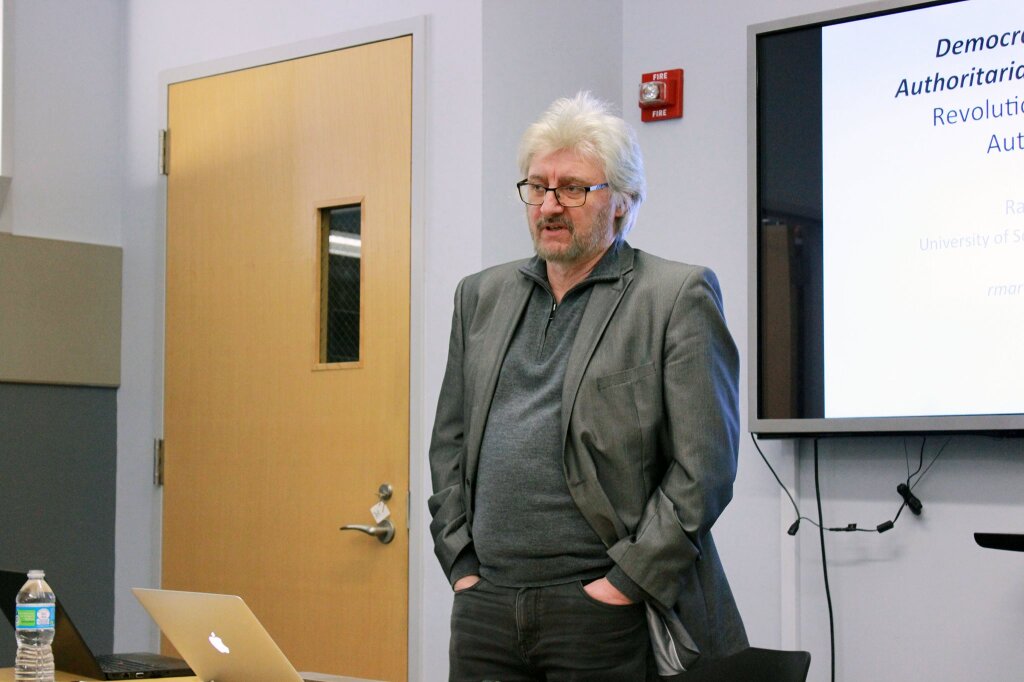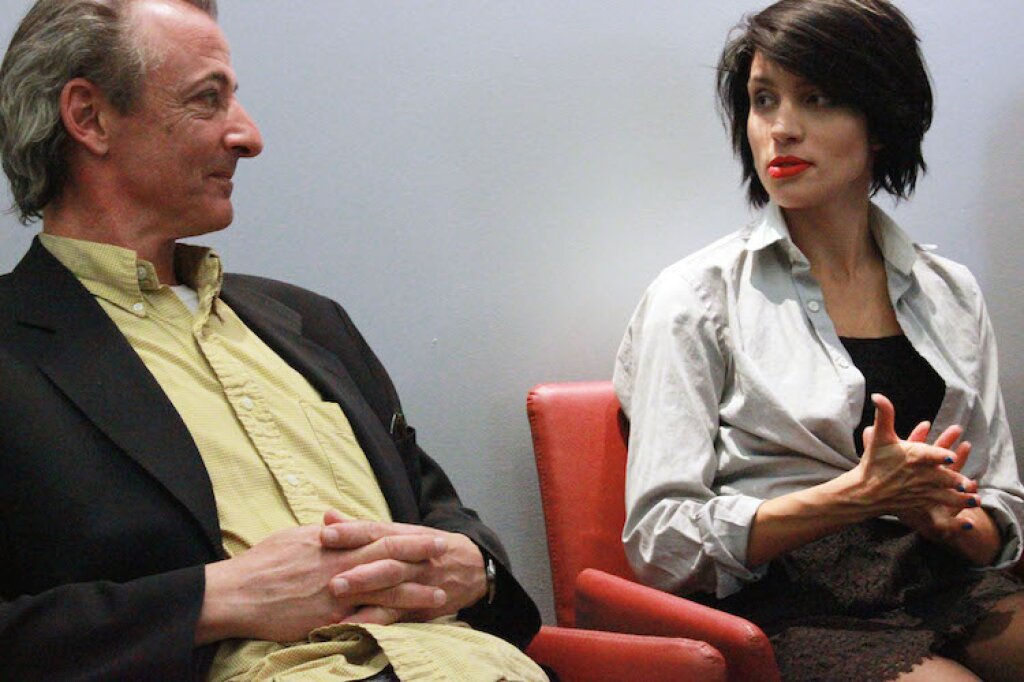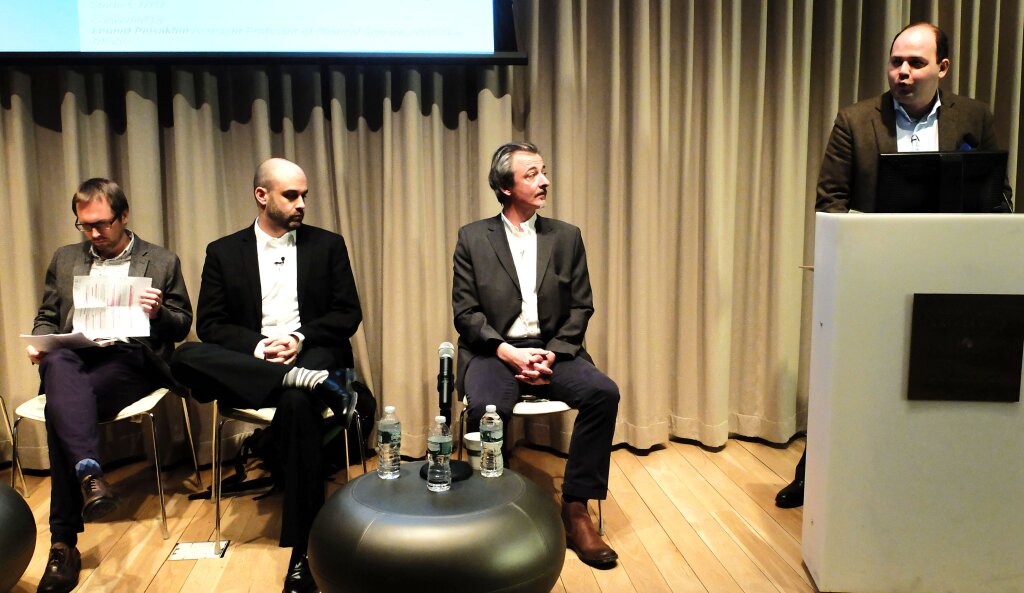On April 19, 2017, the Jordan Center for the Advanced study of Russia at NYU welcomed Radoslaw Markowski for a lecture on “Democratic Backsliding or Authoritarian Charm? On Unexpected Political Development in Poland and Post-Communist Countries.” Markowski arrived in New York from Poland, where he is head of the Comparative Politics Department at the University of Social Sciences and Humanities, an institution that analyses the field of politics sociology and political sciences, and the Principal Investigator of the Polish National Election Study. The event was part of the Occasional Lecture Series, sponsored by the Jordan Center for the Advanced Study of Russia and co-sponsored by the Center for European and Mediterranean Studies. Markowski was introduced by Jordan Center Director Joshua Tucker.
Markowski’s presentation gave an overview of his research and current developments in the sphere of Polish politics, which continues to reel from the election of October 2015 when, after 25 years of relatively stable liberal democracy in Poland, the opposition party—Law and Justice (or PiS)—won 37 percent of the vote. With its victory, PiS became the first party in Poland to win majority in a free election since the fall of communism, and subsequently formed one of the most right-wing governments in Europe. The widely unanticipated results “presented a lot of problems, a lot of question marks about what to do with this new situation,” the speaker said. In fact, he added, “the last Polish election might [have been] the last election [...] in a normal, democratic context.
Markowski first looked to his methodology to outline some limitations and caveats to social science. Political scientists often seek to draw immediate and universal explanations from data, which is impossible, he noted: “When a collapse of a regime happens in an unexpected way [...] we need more time, we need new research,” he said. In fact, Markowski mentioned, “I designed the Polish National Election Study in such a way that it was really hard to use it to interpret what happened [in October 2015].” Markowski also criticized the broadly used and somewhat vague buzzword “populism,” arguing that what is happening in Poland today can be attributed to more of a clientelistic authoritarianism, or authoritarian clientelism. He called for new approaches, if not paradigms, in social science that can reexamine the importance of various aggregates regarding social structure. When studying fragile democracies in Central and Eastern Europe, for instance, Markowski argued that there is need for a revision of theoretical assumptions on transformation and consolidation in democracies, a reevaluation of historical legacies at play, a look at unexpected developments, an examination of coalitions that guide politics, and a focus on gaps in literature on democratic backsliding.
The speaker then turned to history to discuss Polish traditions that may help make sense of current politics in the country—“very peculiar” developments in the 16th- and 17th-century developments. In 1505, for example, a constitution called Nihil novi nisi commune consensu—“Nothing new without the common consent”—was adopted by the Polish Sejm, or parliament, establishing a “nobles’ democracy,” which gave the nobility (about 8 percent of the population) the right to vote and to elect kings. Other legacies from Polish history include the 1772, 1793, and 1795 partitions, which sectioned off the country to Russia, Prussia, and Austria, World War II, and communist rule. “It’s hard to prove how these historical traditions are present in today’s Poland, but [we can speculate that they are alive] in [today’s] rejection of the central authority, the rejection of several institutions, this readiness to say ‘no’ to the public domain and to public policies,” Markowski noted.
Catholicism—as well as a strong civil society—has also continued to define the Polish experience, even under communism. “The important thing is not the religious aspect of the Catholic Church,” Markowski said, “but that there was always an ideological alternative to the communist narrative in Poland.” Today, however, because Catholicism retains its hold as the dominant social group in Polish society—and as secularization continues to threaten the Church’s authority—the Church will continue to align with political parties supportive of its traditional values, much like the evangelical vote for the GOP in the U.S. presidential election, Markowski added.
On the topic of institutional development in Central and Eastern Europe, Markowski asked the audience to reconsider the fall of communism in both Poland and Hungary, run by the “illiberal” Prime Minister Viktor Orbán. In both countries, Markowski said, “the first semi-free election was agreed upon with the communists in such a way that the period of transition was actually prolonged.” Unlike other nations in the region such as Bulgaria or Romania, which shed communism by the early 1990s, Markowski mentioned that Poland’s transition began in 1980, but that the final constitution was not instated until 1997. This created a long period of rules negotiability, rules flexibility, and temporariness, leading to instability in links between voters and political elites. “The important message here is that it seems that people need to have a threshold”—a clear distinction between what is old and what is new, Markowski noted.
Paradoxically, there has been improvement in Poland in many domains since the end of communism. By 2015, the country’s GDP had risen to 220 percent of what it was in 1989. The number of students has grown while the number of peasants and farmers has decreased, and both life-expectancy and life satisfaction have increased. Still, “[when] you ask Poles about the major issues or policies, economic issues are much more important than the socio-cultural: abortion, the role of the Church, historical legacies, et cetera [but] these socio-cultural issues [decide] the election, the vote choice,” Markowski said. He showed a graph from 2007 Polish electorates, illuminating that party lines were divided not along socioeconomic issues, but rather “religious/traditionalist” versus “secular/liberal” values.
Today, the PiS victory poses significant challenges to more than two-decades of democratic rule in Poland. “This government immediately launched an attack on liberal democratic values,” Markowski said. More troubling, he continued, is that “[this] attack on liberal democracy did not come from allegedly unsophisticated citizens, [...] but from the part of the elite which was in place for 25 years. What happens after the election is a completely new logic.” To the speaker, the government is suspicious of elections and pro-European sentiment, and fostering a rebranding campaign that labels Poles as national Catholics in an attempt “to eradicate pluralism and liberal traditions that are allegedly ‘alien’ to Poles.” But more importantly, “the major goal is to change the narrative of Polish history,” Markowski said. Today, this retrospective constructivism is leading to the creation of a new set of institutions, like voluntary paramilitary squads and a series of non-liberal NGOs, much like in Orbán’s Hungary. This new government has created a new language of “political enemies,” “second-sort Poles,” and conspiracy theories, Markowski added. “I am on the list of traitors in Poland,” he said—“[and the] traitors are numerous.”
In the Q&A session that followed, Markowski elaborated on the effects of the 2015 Polish election across numerous spheres. Lauren Crane of the Scholars at Risk Network asked how this dismantling of democratic institutions might influence the higher education sector. “So far there has been no direct influence on the autonomy of universities and education,” Markowski said. But what happened in Budapest “is probably at the end of the tunnel,” he said, referring to the March 2017 Hungarian bill that could force closure of Central European University.
When asked about how Poland fits into the sphere of global politics, particularly given its proximity to Russia, Markowski remarked that unlike with Hungary, the Polish government cannot seek strong relationships with the Kremlin for historical reasons, something only exacerbated by its pro-Ukrainian stance in recent years. "But generally and objectively," the speaker said, "this government [the Russian government] is probably one of the best things that Putin is enjoying these days. It's so easy to use the Polish government as Trojan horse [when it comes to] the EU."
Sean Cates, a Ph.D. student at NYU in the Politics Department, wondered about opposing political parties and the constraints they might pose to PiS. While Orbán won a constitutional majority in 2010 in Hungary, Jaroslaw Kaczynski “cannot say he represents the votes,” Markowski explained. “There is likelihood that in the next election he will be removed from power. The majority of opposition parties in Poland don’t know what to do in this case. They are not ready to go on the streets and protest radically.” Instead, he said, the best strategy would be for all opposition forces to join “under an umbrella that says ‘we are different in programmatic terms and policies’ but [ready to fight] the destruction of democracy.” Still, Markowski ended soberly, “[when] journalists ask me about elections, I say, ‘Elections?’ I am crystal clear from what I hear about manipulation attempts that it will be not as fair or free as previous elections.”



